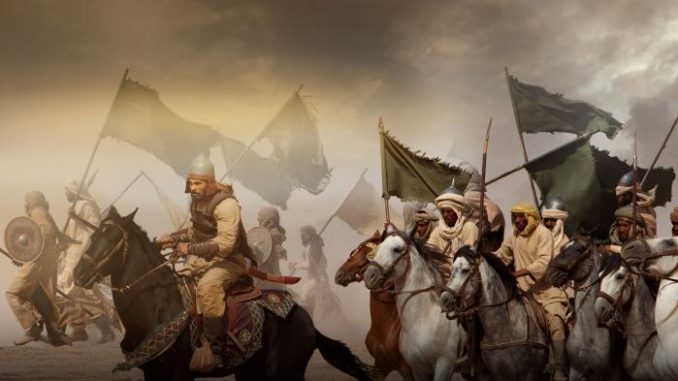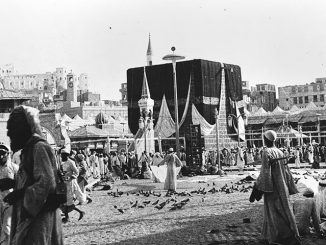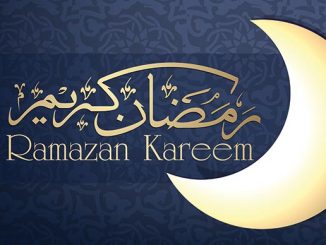
The Battle of Badr
Ramadan is a source of spiritual as well as physical inspiration for Muslims.
Physically, no month in our history has been more charitable and generous with victories than the month of Ramadan.
One of the more remarkable examples is the Badr campaign (Battle of Badr).
This was a battle in which the forces of truth, numbering 300 men against all odds, defeated an army three times their size.
Badr is the name of a rural city about 150 miles from Madinah.
The day of the battle was named the Day of Criterion, Yawmul Furqaan, for #Allah set apart the distinction between truth and falsehood by aiding His #Messenger and the believers against all odds, and abandoning the unbelievers.
All this took place in the month of Ramadan, in the second year of Hijrah.
The reason for this encounter was purely coincidental.
The Messenger of Allah (saas) was informed that his old antagonist and leader of the Quraysh, Abu Sufyan, was returning from Shaam (Northern Arabia) to #Makkah with many camels in a large caravan.
The Messenger called upon his companions to intercept and confiscate the #caravan which contained merchandise for Quraysh businessmen and women.
The reason was because the Quraysh were in a state of war with the new ummah in Madinah, and because the Quraish had appropriated the wealth of the companions who were forced to flee Makkah because of their faith in Islam and suffer merciless persecution at the hand of Makkans.
Furthermore, there was no treaty of nonbelliger-ence between the two parties.
Undoubtedly, the #Muslims had every right to seize the contents of the caravan.
Thus, the Messenger and the companions marched out of #Madinah with 310 men with two horses and the 70 camels. Seventy of the men were muhajireen (immigrants
from Makkah), and the rest were ansaar (the helpers from Madinah). Their objective was to capture the caravan.
They did not intend to fight.
But Allah, in His own will and wisdom de-termined otherwise, Allah (SWT) stated
“That Allah might accomplish a matter already enacted.”
(Al-Qur an, 8:44)
Abu Sufyan knew that he was being tailed so he dispatched a messenger to Makkah to inform them of the impending doom of their caravan, and urged them to swift action.
Meanwhile, he drove the caravan off the desert’s main highway and took a safer but longer coastal route instead, and escaped.
The Quraysh, on the other hand, upon receiving this alarming news called for a general declaration of war.
The Quraysh were mighty and heavily prepared. Immediately, 1000 strong men were enlisted, including their warlords and generals.
They amassed 100 horses and 700 camels.
Their ob-jective was to show off. Allah (SWT) stated:
“And be not like those who started from their homes insolently and to be seen by men and to hinder (people) from the path of Allah…”
(Al-Qur’ an, 8: 47)
The army included singers to sing ill of the Muslims and dance at their defeat.
When Abu Sufyan knew of their setting out, he sent them a message that the caravan had escaped, and that there was no need for the Quraysh to continue the journey, and urged them to return to Makkah and not to fight.
The warmon-gers of the Quraysh refused to heed Abu Sufyan’s call and in-sisted on continuing.
The head of the pack, Abu Jahl (the Fa-ther of Ignorance), was reported as saying:
“By Allah, we will not return until we reach Badr, spend three days there, slaughter camels, eat and drink wine and
liquor, and let the Arabs hear about us so they will continue to fear us forever.”
As for the Messenger (saas), when he leaned that the Quraysh were heading towards Madinah, gathered his companions and sought their counsel in this grave matter. He told them,
“Allah has promised me one of two groups, either the caravan or the army.”
Al-Miqdad bin Aswad (raa) stood up to represent the muha-jireen, and said:
“O Messenger of Allah, proceed with what Allah (SWT) commanded you.
By Allah, we will not say to you what the Israelites said to their Prophet Musa: ‘Go thou and thy lord and fight ye two while we sit here and watch.’
Instead we will fight on your right, on your left, in your front and on your rear.”
The head of Al-Aws, Sad bin Mu’aadh (raa), spoke on behalf of the ansaar, saying:
“O Messenger of Allah, I hope you are not afraid that ansaar will not see it incumbent upon them to join you unless the enemy is in their homes.
I would like to say on behalf of the ansaar:
‘Go wherever you wish, connect the rope of whoever you wish, break the rope of who-ever you wish, take from our wealth whatever you de-sire, give us out of it whatever you wish, whatever you take from us is better for us than what you left, what-ever you command of us we shall obey you.
By Allah, if you decide to travel and take us with you until you reach the pool of Ghamdan, we will travel with you.
If you ask us to cross a sea and you cross it we will cross it with you.
We are not afraid to meet the enemy tomor-row.
We are patient in war, truthful in the #battlefield.
Perhaps Allah will show you in us what will please your eyes.’ ”
The Messenger of Allah (saas) was delighted with what he heard from both the muhajireen and ansaar (raa). He said,
“Go delightfully forward. By Allah, it is as if I am look-ing at the death places of the people.”
The Messenger of Allah (saas) proceeded with the army of the Most Gracious until they camped at a well among the wells of
Badr. When they were about to settle down, Al-Hubab bin Al-Mindhir Bin ” Amru bin Jamuh (raa) asked:
“O Messenger of Allah, this place we settled in, is it a place Allah commanded us to camp in whereby we can
not leave it? Or is it your idea of war strategy and tac-tics?”
The Messenger replied,
“It is my own idea of war strategy and tactics.”
He counselled
“O Messenger of Allah, this is not a suitable place.
Let us move to the well nearest to our enemy and settle down there while we cover up all the wells behind us with sand and palm trunks.
We then should build on it a trough and fill it with our drinking water and they will not have any to drink.”
The Messenger liked the idea; he moved to the lower side with the city of Medinah at their back, and the #Quraysh took the side that faced Makkah.
On the eve of the #battle, Allah sent a mysterious rain.
On the side of the Quraish it fell heavily.
It soaked everything and cre-ated very slippery muddy conditions, making it difficult for the enemy’s army to move forward.
Whereas on the side of the Muslims, it was a light drizzle that refreshed them and ce-mented the sand and stabilized their movement.
The believers built a war booth on a hill overlooking the battle-field for their commander in chief, the Messenger of Allah (saas).
He came down from the booth to straighten the lines of his #companions and as he walked over the field he pinpointed the death spots of the enemy soldiers, he prophesied:
“This is where so and so will fall, Allah willing; this is where so and so will fall.”
When the battle was over none of these people missed where they were supposed to fall and die, as the Messenger had pointed out before the war.
The Messenger then looked at his companions and at the Quraysh and said:
“O Allah the Quraysh came with their vain glory, and boasting, and horses daring You, belying Your Messen-ger.
O Allah, grant me Your assistance that You prom-ised me.
O Allah, accomplish for me that which You promised me.
O Allah, I remind You of Your promise and Your decree.
O Allah, if You willed You would never be worshipped.
O Allah, If this army is defeated today You will never be worshipped.”
Muslims sought help from Allah and He answered them, as He stated:
“Remember thy Lord inspired the angels (with the message): ‘I am with you, give firmness to the believers I will instill terror into the hearts of the unbelievers, smite ye all their fingers-tips off them.
This because they contended against Allah and His Apostle.
If any contend against Allah and His apostle, Allah is strict in punish-ment.’ ”
(Al-Qur an, 8: 12-13)
The two armies met in a fierce battle.
The fighting intensified and went on and on.
The Messenger was in his war camp and with him was Abu Bakr and Sa’ad bin MiTaadh guiding him.
The Messenger in the meantime, was praying Allah for help and victory.
He napped for a little while and woke up to en-courage the Muslims and to promise:
“Nay, the hour of Judgement is the time prom-ised them, for their Hour will be Most grievous and most bitter.”
(Al-Qur an, 54: 46)
He encouraged his companions to fight, and said:
“I swear by the One in whose hand Muhammad’s soul is, any man who fights them today and is killed while he is patient in the ordeal and seeks the pleasure of Allah, going forward and not backing off, Allah will enter him into Paradise.”
‘Umair bin Himaam Al-Ansaari (raa) stood up with a few dates in his hand and was about to eat them, and asked:
“O Messenger of Allah, a paradise whose width is like the width of heavens and earth?” The Messenger re-sponded: “Yes.”
TJmair said: ‘Bakhin! Bakhin! (indicat-ing strong appreciation and acceptance) O Messenger of
Allah, there is nothing between me and paradise except to be killed by these people.
If I live to eat these dates that will be a long life.”
Then he threw the dates away and fought until he was killed.
The Messenger (saas) took a handful of sand or stones and threw them at the enemy soldiers and no one was hit by this sand but blinded them and or it preoccupied them.
This was a divine intervention from Allah.
The enemy soldiers could not
fight after that and they were defeated.
The remaining soldiers flew from the battlefield in all directions and the Muslims went after them.
Seventy of them were killed and seventy were taken as prisoners of war.
Twenty four of the dead were the warlords of the Quraysh whom, the Messenger ordered to be thrown into a well.
They included the arch-infidel, Abu Jahl, Ahaibah bin Rabee’ah and his brother ‘Utbah and his son Al-Waleed bin ‘Utbah.
Abdullah bin Mas’ud (raa) reported that the Messenger (saas) faced the Ka’abah and prayed over these four and said:
“I bear witness that I saw them dead. The sun has changed their appearance because it was a hot day.”
After the war the Messenger (saas) stayed at Badr for three days, and as he was riding his horse, on the third day, he pulled away where he came to the edge of a well.
He stood and started to call the dead among the enemies by their full names and the names of their fathers.
“O so and so, the son of such and such, are you happy that you have disobeyed Allah and His Messenger, for we found what Allah promised us in truth have you found what Allah promised you in truth?”.
TJmar (raa) and many companions, inquired in astonishment, “O Mes-senger of Allah, why do you speak to bodies that have no souls?”
The Messenger replied: “I swear by the One in whose hand Muhammad’s soul is, you do not hear what I say more than they do.”
As for the prisoners of war, the Messenger asked his compan-ions their opinions.
Sa’ad bin Mu’aadh (raa) commented:
“This is the first defeat for the polytheists.
I would have preferred the continuation of the battle than to have taken men as prisoners of war.”
“Umar bin Khattab (raa) said: “I think that it would have been better to allow us to kill them.
Allow ‘Ali bin Abi Talib to kill “Aqeel and allow me a member of my family, for these people are the leaders of the unbelief.”
Abu Bakr, on the other hand, said: “These are our uncles and families.
I think it would be better to take ransom from them to strengthen our-selves with funds, perhaps Allah will guide them into Is-lam.”
The Messenger took ransom from them.
Most of them gave between four to a 100 dirham.
Some provided services by teaching the Muslim children of Madinah the basics of reading and writing, others by freeing a Muslim bonds man or woman in Makkah.
Some were killed because of their crimes against Muslims, while others were let go.
The lessons of this battle are very obvious.
An army outnum-bered three to one was victorious because it was fighting in the path of Allah, because it stood firm to raise the banner of Allah and to defend Allah’s religion, so Allah helped them.
Anyone who stood on the same principle, the result would be the same.
Indeed, Ramadan is not a period to slacken, it is a serious time in which serious decisions are taken and higher goals are achieved.



